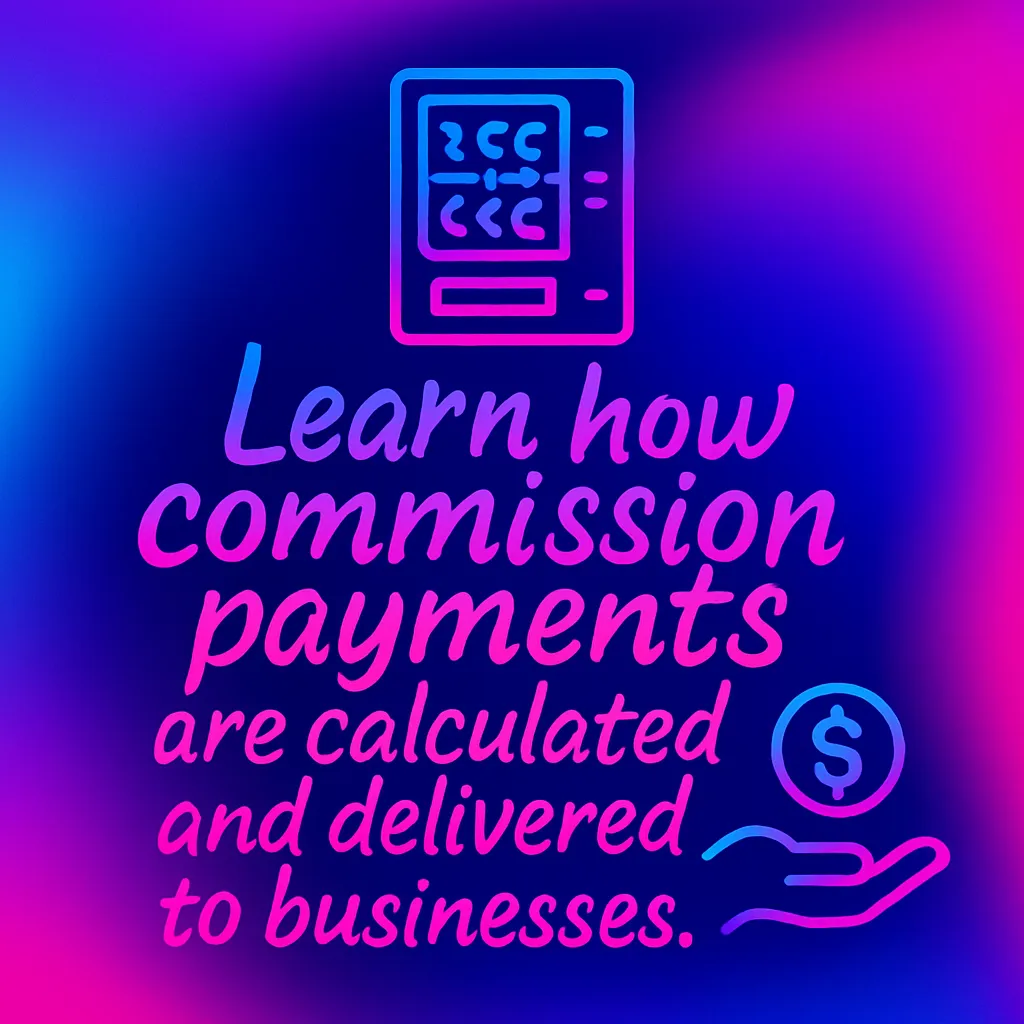How Do Vending Machine Commissions Work?
Learn how commission payments are calculated and delivered to businesses.
Back to Vending FAQs ResourcesLearn how commission payments are calculated and delivered to businesses.
Back to Vending FAQs ResourcesUnlock a new revenue stream for your business without any upfront investment. Vending machine commissions allow you to earn a percentage of every sale made on your premises.
![]() Generate passive income with minimal effort
Generate passive income with minimal effort
![]() Enhance tenant or employee satisfaction with convenient amenities
Enhance tenant or employee satisfaction with convenient amenities
![]() Benefit from full-service machine management and maintenance
Benefit from full-service machine management and maintenance

For many businesses, hosting a vending machine isn’t just about providing a convenience; it’s an opportunity to generate a passive income stream through commissions. Understanding how these commissions work is crucial for maximizing your earnings and ensuring a beneficial partnership with your vending provider.
Vending machine commissions are typically a percentage of the gross sales generated by the machine on your property. This means that for every item purchased, a portion of that sale goes directly to your business. The exact percentage can vary widely, often depending on factors like the volume of sales, the type of products offered, and the location's foot traffic. A busy office or a public waiting area with high demand for snacks and drinks might command a higher commission rate than a less frequented spot.
For example, if a machine generates $500 in sales in a month and your agreed commission rate is 15%, your business would earn $75. These payments are usually made monthly or quarterly, ensuring a regular income flow without any operational responsibilities on your part.
Several key elements come into play when determining the commission rate. Locations with high foot traffic or captive audiences, such as hospitals, schools, or manufacturing plants, often qualify for better commission percentages due to higher sales potential. The type of machine and products also matter; machines offering premium or specialized items might have different commission structures. For a deeper dive into these agreements, consider reviewing resources like Commissions in Vending Contracts.
When entering a vending machine partnership, the commission rate is a significant point of negotiation. It’s essential to have a clear understanding of the terms in your vending contract. The contract should explicitly state the commission percentage, the payment schedule, and how sales will be tracked and reported. In certain scenarios, some businesses might choose a "free vending" model, where they receive no commission but also bear no responsibility whatsoever, primarily valuing the amenity for their employees or customers. To know more about what costs you could expect, refer to How Much Do Vending Services Cost?
Ultimately, a successful vending machine commission arrangement is a win-win: your business earns revenue, and your employees or customers enjoy convenient access to refreshments. By understanding the mechanics of commissions, you can ensure a profitable and hassle-free vending experience.
A vending machine commission is a percentage of the sales generated by a vending machine that is paid to the location owner where the machine is placed.
Commissions are usually calculated as a percentage of the vending machine's gross sales. For example, if a machine makes $1000 in sales and the commission rate is 10%, the location owner receives $100.
Factors include location traffic, expected sales volume, type of products sold, machine placement (indoor/outdoor), and the negotiating power of both parties.
While there isn't a single standard, commission rates often range from 5% to 20% of gross sales, depending on factors like location profitability and industry.
Payment schedules vary but are typically monthly or quarterly. The payment terms should be clearly outlined in the vending service contract.
No, some businesses may opt for free vending services where the machine is provided and serviced at no cost, without receiving a commission. High-traffic locations are more likely to earn commissions.
Gross sales refer to the total revenue generated before any deductions, while net sales are after returns, allowances, and sometimes cost of goods sold. Commissions are almost always based on gross sales.
Yes, commission rates can often be renegotiated, especially if sales volume increases significantly or if the initial contract terms are expiring. Clear communication with the vending provider is key.
Vending providers typically offer detailed sales reports, either digital or physical, showing transaction data, product sales, and the calculation of the commission owed for the period.
Reputable vending service contracts clearly outline expenses. Commissions are typically calculated on gross sales before any operational expenses of the vending provider are considered. Always review the contract for clarity on all financial terms.